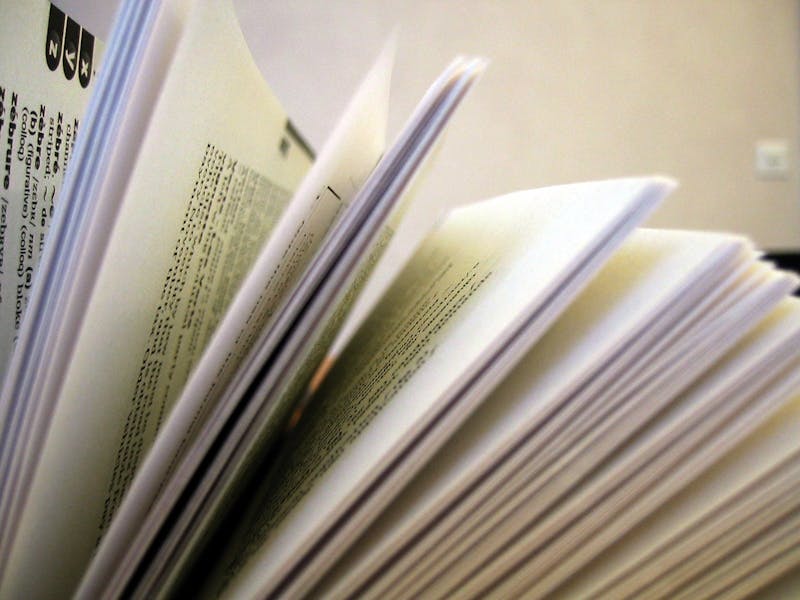Print Vs Digital - The Future Of Dictionaries

Dictionaries have existed for hundreds of years, offering word definitions to people all over the globe. The first dictionary was published in 1604, written by an English clergyman called Robert Cawdrey, and it's quite staggering how far we've come. Online dictionaries are now the norm, and with social media and tech platforms propelling us to be clearer, more concise, and sometimes more eloquent with our speech, we ask the question; Is there still a place for paper dictionaries in the 21st century? In this article, we'll go over the fascinating history of the dictionary and the forms it's taken throughout the years. We'll see what the benefits are to printed dictionaries, and what the future looks like; whether we are truly destined for digital, or whether paper might make a comeback.
The History Of The Dictionary
When we talk about the first dictionary, we have to be a little more specific about what a dictionary is. In its simplest form, a dictionary is a source for finding a word's meaning. However, books, texts, and scrolls have been used for millennia to represent ideas, or offer translations between languages. The first manifestation of what we know as the modern dictionary concept started to appear in the early 1500s. The dictionary of Syr Thomas Eliot Knyght, a Latin-English dictionary, was published in 1538 and saw great success in offering translations and meanings between those two languages. But as we mentioned before, it wasn't until 1604 that Robert Cawdrey came out with the first full English dictionary. During the 1600s and 1700s, more and more updates and publications preceded Cawdrey's dictionary, resulting in a better understanding of language and spelling throughout the English-speaking world.
As the dictionary developed throughout the 1800s, milestones of modern language began to become more and more significant. Perhaps the greatest of which came was Noah Webster’s American Dictionary of English Language, published in 1828. Webster's dictionary was not without its controversy, as it came with a bunch of spelling changes that still divide the English language today. 'Americanistaions' of words became the norm; the word 'honour' changed to 'honor', the word 'centre' to 'center' and this was one of the first mass-produced texts to have this kind of effect since the literature during the great vowel shift between the 1400s and 1700s.
The Era Of Digital Dictionaries
Jump forward to 1985, and psychologist and cognitive scientist George A. Miller and his team at Princeton University began developing WordNet - a database for the English language. The purpose was twofold. Firstly, to produce and combine a dictionary and thesaurus that was intuitively usable, and secondly to support automatic text analysis and A.I. applications. The project was originally funded by the U.S. Office of Naval Research and later also by other U.S. government agencies, including the DARPA, and the National Science Foundation.
With the birth of home computing and the internet, dictionaries became available at the click of a mouse. Merriam-Webster dictionaries began publishing in electronic formats, including CD-ROMs and handheld devices, from the 1980s. In 1996 Merriam-Webster introduced Merriam-Webster OnLine, a resource still seen as America's number one trusted dictionary destination. The past decade has seen many of these valuable sites made yet more accessible with the creation of apps to be downloaded and carried around in your pocket. In some ways, things have come around full circle.
Digital Dictionary Resources
Moving away from the history of dictionaries and their significance to the world, we wanted to point out a few very interesting ways dictionaries can be educational and useful tools for the modern era. 'Jargon' is very common with specialist jobs, and for a beginner investing themselves into a particular area, the language barrier may seem jarring. NASA's Young Explorer Dictionary is a perfect example of a dictionary that has been adapted to explain the jargon of space. Investopedia has a very similar thing referring to complex business terms and Hoodhousekeeping with cooking terms. This modern, and simpler use of dictionary capabilities is part of the reason that online language tools have become so popular and preferred over their paper competitors. Below we’ve collected a few other invaluable resources based around the themes of finance, space and cooking.
Finance
- Financial Dictionary - Over 300 financial terms explained easily as well as useful articles on investing
- Junior Achievement - Featuring a vast financial literacy dictionary. Ideal for beginners
- Consumer Financial Protection Bureau - Financial terms glossary made with students/teaching in mind
- Word Finance - Easy to navigate dictionary with succinct but in-depth descriptions
Space
- Msnucleus - Extensive no frills space science dictionary
- Sea and Sky - A glossary of awe-inspiring astronomy terms
- Solar Views - From aurora to umbra - a glossary of the solar system and space
Cookery
- What's Cooking America - A culinary dictionary and glossary that includes the definitions and history of cooking
- Crush Mag - A-Z of cooking terms boasting everything you need to know in the kitchen
- Raddish Kids - Need-to-know terms for budding chefs
- Findlay - Handy glossary demystifying the intimidating world of French cuisine
Which Is Better - Print Or Digital
Your immediate reaction to this question would surely be to shout, 'Digital!' - right? After all, thanks to the information age, we've access to dictionaries of all languages within a few simple taps of our fingers. Good old print, however, still boasts a few winning traits. Firstly, manually looking through a print dictionary helps improve spelling. Without spell checks giving us a helping hand, we're forced to truly focus on, and remember, the word we're searching for. In the process of looking, your eye will also be drawn to other words on the pages, helping you discover new ones. Furthermore, by flicking through an alphabetical book, you're forced to get your memory, and spelling skills fired up, letting your brain connect separate words and intuitively figuring out what might come next in the sequence. Essentially, print dictionaries allow the reader to linger, explore and truly search for the term they're grasping for. It's not the destination; it's the journey, after all.
Digital dictionaries, on the other hand, are all about accessibility - and that trumps everything. Fancy print dictionaries in olden times were seen as status symbols, the sign of a learned and ambitious family. Thankfully nowadays, anyone with a love of language and learning can improve their vocabulary within seconds. If someone has a disability that may mean they can't hold a print dictionary, a digital one can be searched for vocally. Correct pronunciation can be spoken aloud thanks to the likes of Google, and even special gaming dictionaries for big favorites like Scrabble live online. The digital space allows room for evaluation and innovation.
Resources:
- First Published Dictionary - British Library
https://www.bl.uk/learning/timeline/item102970.html - History Of The Dictionary - Public OED
https://public.oed.com/blog/the-first-dictionaries-of-english/ - The Story Of Noah Webster - Noah Webster House
https://noahwebsterhouse.org/noahwebsterhistory/ - Birth Of Merriam-Webster's - Books Tell You Why
https://blog.bookstellyouwhy.com/the-history-and-significance-of-dictionaries - Electronic Dictionary - VR World
https://vrworld.com/2015/01/19/japans-magnificent-electronic-dictionary/ - Common Business Terms - Investopedia
https://www.investopedia.com/financial-term-dictionary-4769738 - Cooking Terms - Goodhousekeeping
https://www.goodhousekeeping.com/food-recipes/cooking/tips/a16958/dictionary-cooking-terms/ - Space Terms - NASA
https://www.nasa.gov/audience/forstudents/k-4/dictionary/index.html

About the author
Casey Wise
Casey Wise is a British journalist, creative copywriter, and music creator with a deep passion for language, travel, and technology. Based in Barcelona, his work extends from local start-ups and newspapers to university radio and the British NHS.

